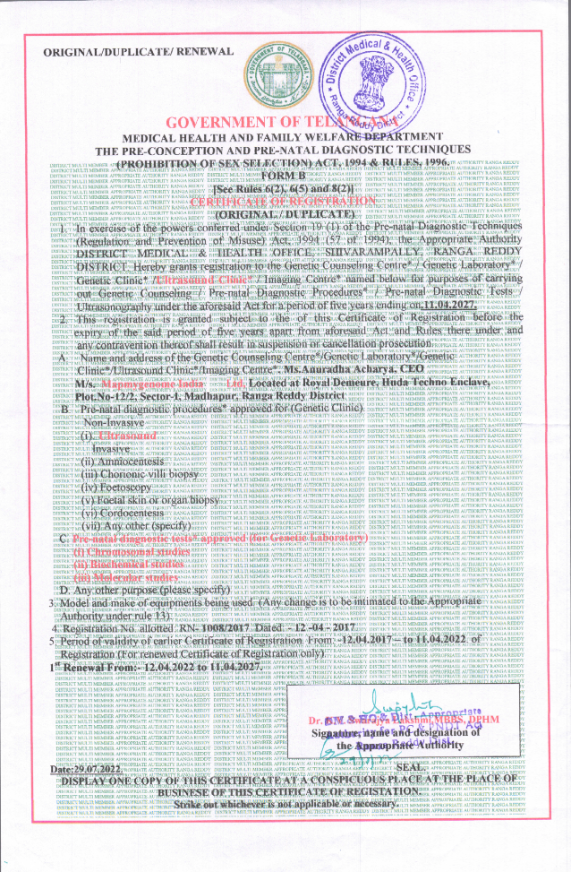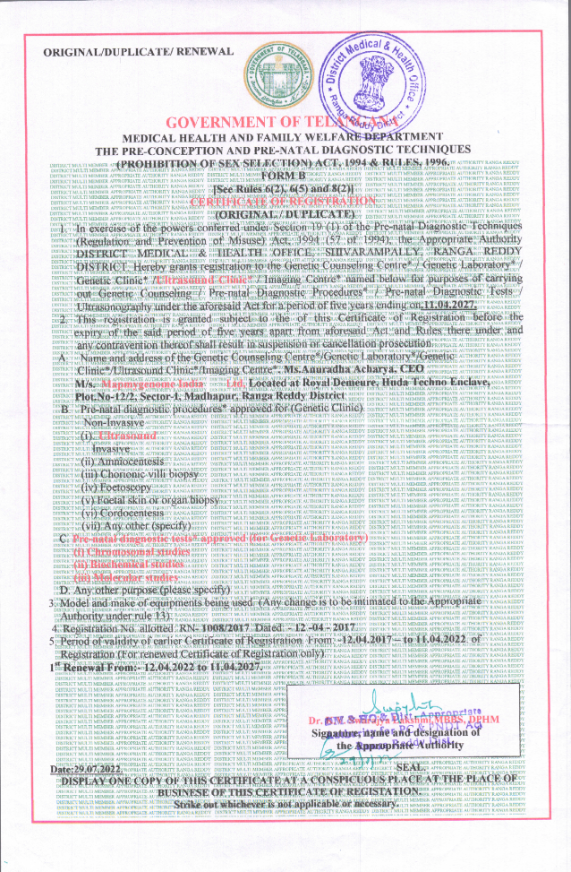बच्चे की उम्मीद करना एक रोमांचक और खुशी का समय होता है, लेकिन इसके साथ ही ऐसे महत्वपूर्ण निर्णय भी आते हैं जो बच्चे और माता-पिता दोनों के भविष्य के स्वास्थ्य और कल्याण को आकार दे सकते हैं। प्रसवपूर्व देखभाल में सबसे महत्वपूर्ण प्रगति में से एक प्रसवपूर्व आनुवंशिक परीक्षण है, जो माता-पिता को जन्म से पहले अपने बच्चे के स्वास्थ्य के बारे में मूल्यवान जानकारी प्राप्त करने की अनुमति देता है। इस प्रकार के परीक्षण से आनुवंशिक विकारों और गुणसूत्र संबंधी असामान्यताओं का पता लगाया जा सकता है, जो माता-पिता को तैयारी करने, सूचित निर्णय लेने और यदि आवश्यक हो तो सक्रिय कदम उठाने में मदद करने वाली महत्वपूर्ण जानकारी प्रदान करता है।
इस ब्लॉग में, हम प्रसवपूर्व आनुवंशिक परीक्षण के लाभों, उपलब्ध परीक्षणों के प्रकारों, तथा यह जानेंगे कि आधुनिक प्रसवपूर्व देखभाल में भावी माता-पिता को इस महत्वपूर्ण उपकरण पर विचार क्यों करना चाहिए।
प्रसवपूर्व आनुवंशिक परीक्षण क्या है?
प्रसवपूर्व आनुवंशिक परीक्षण में गर्भावस्था के दौरान बच्चे की आनुवंशिक सामग्री के नमूने का विश्लेषण करना शामिल है ताकि किसी भी संभावित आनुवंशिक विकार या गुणसूत्र संबंधी असामान्यताओं की पहचान की जा सके। ये परीक्षण बच्चे के विकास के बारे में प्रारंभिक जानकारी प्रदान कर सकते हैं और निम्नलिखित स्थितियों का पता लगाने में मदद कर सकते हैं:
- डाउन सिंड्रोम
- पुटीय तंतुशोथ
- स्पाइना बिफिडा
- दरांती कोशिका अरक्तता
- फ्रैजाइल एक्स सिंड्रोम
- थैलेसीमिया
प्रसवपूर्व आनुवंशिक परीक्षण के परिणाम से गर्भवती माता-पिता को आश्वस्ति मिल सकती है या उन्हें अपने शिशु के स्वास्थ्य और संभावित उपचार विकल्पों के बारे में सूचित निर्णय लेने में मदद मिल सकती है।
प्रसवपूर्व आनुवंशिक परीक्षण के प्रकार
प्रसवपूर्व आनुवंशिक परीक्षण की दो मुख्य श्रेणियां हैं: स्क्रीनिंग परीक्षण और नैदानिक परीक्षण । दोनों ही विकासशील भ्रूण के स्वास्थ्य को समझने में महत्वपूर्ण भूमिका निभाते हैं।
1. स्क्रीनिंग टेस्ट
स्क्रीनिंग टेस्ट इस जोखिम का आकलन करते हैं कि बच्चे में आनुवंशिक विकार या गुणसूत्र संबंधी असामान्यता हो सकती है। हालांकि वे एक निश्चित निदान प्रदान नहीं करते हैं, लेकिन वे संकेत दे सकते हैं कि क्या आगे की जांच आवश्यक हो सकती है। आम प्रसवपूर्व स्क्रीनिंग टेस्ट में शामिल हैं:
- नॉन-इनवेसिव प्रीनेटल टेस्टिंग (NIPT) : यह रक्त परीक्षण डाउन सिंड्रोम जैसी गुणसूत्र संबंधी असामान्यताओं का पता लगाने के लिए माँ के रक्त में बच्चे के डीएनए के टुकड़ों का विश्लेषण करता है। NIPT अत्यधिक सटीक है और इसे गर्भावस्था के 10 सप्ताह की शुरुआत में ही किया जा सकता है।
- अल्ट्रासाउंड : अल्ट्रासाउंड के दौरान, स्वास्थ्य सेवा प्रदाता बच्चे की शारीरिक संरचना की जांच करता है ताकि किसी भी शारीरिक असामान्यता, जैसे स्पाइना बिफिडा या हृदय दोष का पता लगाया जा सके।
- प्रथम तिमाही स्क्रीनिंग : यह परीक्षण डाउन सिंड्रोम और ट्राइसोमी 18 जैसे गुणसूत्र संबंधी विकारों के जोखिम का आकलन करने के लिए रक्त परीक्षण और अल्ट्रासाउंड को सम्मिलित करता है।
2. नैदानिक परीक्षण
डायग्नोस्टिक टेस्ट कुछ आनुवंशिक स्थितियों या गुणसूत्र संबंधी असामान्यताओं का निश्चित निदान प्रदान करते हैं। यदि स्क्रीनिंग टेस्ट में उच्च जोखिम का संकेत मिलता है तो अक्सर इन परीक्षणों की सिफारिश की जाती है। सामान्य डायग्नोस्टिक प्रसवपूर्व परीक्षणों में शामिल हैं:
- एमनियोसेंटेसिस : इस प्रक्रिया के दौरान, बच्चे के आस-पास की थैली से थोड़ी मात्रा में एमनियोटिक द्रव निकाला जाता है और आनुवंशिक असामान्यताओं के लिए उसका विश्लेषण किया जाता है। एमनियोसेंटेसिस आमतौर पर गर्भावस्था के 15 से 20 सप्ताह के बीच किया जाता है।
- कोरियोनिक विलस सैंपलिंग (सीवीएस) : सीवीएस में क्रोमोसोमल असामान्यताओं और कुछ आनुवंशिक विकारों का परीक्षण करने के लिए प्लेसेंटा से कोशिकाओं का नमूना लेना शामिल है। यह आमतौर पर गर्भावस्था के 10 से 13 सप्ताह के बीच किया जाता है।
प्रसवपूर्व आनुवंशिक परीक्षण के लाभ
प्रसवपूर्व आनुवंशिक परीक्षण से कई लाभ मिलते हैं जो माता-पिता को भविष्य के लिए तैयार होने, अपने बच्चे के स्वास्थ्य को सुनिश्चित करने और सूचित विकल्प बनाने में मदद कर सकते हैं। यहाँ कुछ प्रमुख लाभ दिए गए हैं:
1. आनुवंशिक विकारों का शीघ्र पता लगाना
प्रसवपूर्व आनुवंशिक परीक्षण के सबसे महत्वपूर्ण लाभों में से एक गर्भावस्था में आनुवंशिक विकारों का जल्दी पता लगाने की क्षमता है। प्रारंभिक पहचान माता-पिता और स्वास्थ्य सेवा प्रदाताओं को स्थिति के प्रबंधन और जन्म के बाद किसी भी आवश्यक चिकित्सा हस्तक्षेप या विशेष देखभाल की तैयारी में सक्रिय होने की अनुमति देती है।
उदाहरण के लिए, गर्भावस्था के दौरान डाउन सिंड्रोम या स्पाइना बिफिडा जैसी स्थितियों का पता लगाया जा सकता है, जिससे माता-पिता को सर्जरी या शुरुआती उपचार जैसे उपचार विकल्पों का पता लगाने में मदद मिलती है, जिससे बच्चे के जीवन की गुणवत्ता में सुधार हो सकता है। संभावित स्वास्थ्य समस्याओं के बारे में पहले से जानने से माता-पिता को अधिक तैयार और आश्वस्त महसूस करने में मदद मिल सकती है।
2. व्यक्तिगत देखभाल योजनाएँ
प्रसवपूर्व आनुवंशिक परीक्षण से प्राप्त जानकारी के साथ, स्वास्थ्य सेवा प्रदाता माँ और बच्चे दोनों के लिए व्यक्तिगत देखभाल योजनाएँ विकसित कर सकते हैं। इसमें गर्भावस्था के दौरान अतिरिक्त निगरानी, प्रारंभिक चिकित्सा हस्तक्षेप की योजना बनाना, या माता-पिता को ऐसे विशेषज्ञों से जोड़ना शामिल हो सकता है जो सहायता प्रदान कर सकते हैं।
उदाहरण के लिए, यदि किसी परीक्षण से किसी विशेष आनुवंशिक विकार का उच्च जोखिम पता चलता है, तो स्वास्थ्य देखभाल टीम विशेष रूप से प्रसवपूर्व देखभाल प्रदान कर सकती है, जिससे यह सुनिश्चित हो सके कि गर्भावस्था के दौरान शिशु और मां दोनों को सर्वोत्तम संभव चिकित्सा सुविधा मिले।
3. भावी माता-पिता के लिए मानसिक शांति
गर्भावस्था उत्साह का समय हो सकता है, लेकिन अनिश्चितता का भी। कई माता-पिता अपने बच्चे के स्वास्थ्य के बारे में चिंता का अनुभव करते हैं, खासकर अगर परिवार में आनुवंशिक विकारों का इतिहास रहा हो या अगर माँ की उम्र अधिक हो। प्रसवपूर्व आनुवंशिक परीक्षण मन की शांति प्रदान कर सकता है, क्योंकि यह बच्चे के विकास और संभावित स्वास्थ्य स्थितियों के बारे में अधिक जानकारी प्रदान करता है।
कई माता-पिता के लिए, प्रसवपूर्व परीक्षणों के परिणाम जानने से तनाव कम हो सकता है, जिससे वे अधिक आत्मविश्वास के साथ अपने शिशु के आगमन की तैयारी पर ध्यान केंद्रित कर सकते हैं।
4. सूचित निर्णय लेना
विस्तृत आनुवंशिक जानकारी तक पहुँच होने से माता-पिता अपने बच्चे के भविष्य के स्वास्थ्य के बारे में सूचित निर्णय लेने में सक्षम होते हैं। यदि प्रसवपूर्व परीक्षण में आनुवंशिक विकार या गुणसूत्र संबंधी असामान्यता का पता चलता है, तो माता-पिता उपचार विकल्पों पर चर्चा कर सकते हैं, प्रारंभिक हस्तक्षेपों पर विचार कर सकते हैं, और यहां तक कि नैदानिक परीक्षणों का भी पता लगा सकते हैं जो अत्याधुनिक उपचार प्रदान कर सकते हैं।
इसके अतिरिक्त, जन्मपूर्व आनुवंशिक परीक्षण माता-पिता को परीक्षण के परिणामों के निहितार्थों को बेहतर ढंग से समझने और अपने विकल्पों पर विचार करने के लिए आनुवंशिक परामर्श लेने का अवसर देता है। आनुवंशिक परामर्शदाता माता-पिता को अपने बच्चे के स्वास्थ्य और कल्याण के बारे में निर्णय लेने में भावनात्मक समर्थन और मार्गदर्शन प्रदान कर सकते हैं।
5. परिवार नियोजन संबंधी विचार
प्रसवपूर्व आनुवंशिक परीक्षण न केवल वर्तमान गर्भावस्था के बारे में जानकारी प्रदान करता है, बल्कि माता-पिता को भविष्य की योजना बनाने में भी मदद कर सकता है। यदि आनुवंशिक विकार का पता चलता है, तो माता-पिता भविष्य की गर्भावस्था के लिए विकल्पों की खोज कर सकते हैं, जैसे कि इन विट्रो फर्टिलाइजेशन (आईवीएफ) के दौरान प्रीइम्प्लांटेशन जेनेटिक डायग्नोसिस (पीजीडी) ताकि भविष्य के बच्चों में आनुवंशिक विकारों के संचरण को रोका जा सके।
इसके अतिरिक्त, जिन माता-पिता को पता चलता है कि वे किसी आनुवंशिक विकार के वाहक हैं, वे इस जानकारी का उपयोग परिवार नियोजन के बारे में निर्णय लेने के लिए कर सकते हैं तथा यह भी तय कर सकते हैं कि उन्हें और बच्चे पैदा करने से पहले अतिरिक्त आनुवंशिक परीक्षण कराना चाहिए या नहीं।
प्रसवपूर्व आनुवंशिक परीक्षण पर किसे विचार करना चाहिए?
प्रसवपूर्व आनुवंशिक परीक्षण सभी भावी माता-पिता के लिए उपलब्ध है, लेकिन कुछ व्यक्तियों को इससे अधिक लाभ होने की संभावना हो सकती है। आपको प्रसवपूर्व आनुवंशिक परीक्षण पर विचार करना चाहिए यदि:
- आपकी आयु 35 वर्ष या उससे अधिक है (उन्नत मातृ आयु)
- आपके परिवार में आनुवंशिक विकारों का इतिहास है
- आप या आपका साथी किसी आनुवंशिक विकार के ज्ञात वाहक हैं
- आपकी पिछली गर्भावस्था के परिणाम असामान्य रहे हैं
- आप गुणसूत्र संबंधी असामान्यताओं या जन्म दोषों के बारे में चिंतित हैं
- आप जन्म से पहले अपने बच्चे के स्वास्थ्य के बारे में अधिक जानना चाहते हैं
अपने स्वास्थ्य सेवा प्रदाता या आनुवंशिक परामर्शदाता से परामर्श करने से आपको यह निर्धारित करने में मदद मिल सकती है कि आपकी स्थिति के लिए कौन से प्रसवपूर्व आनुवंशिक परीक्षण उपयुक्त हैं।
क्या इसमें कोई जोखिम शामिल है?
जबकि एनआईपीटी और अल्ट्रासाउंड जैसे प्रसवपूर्व आनुवंशिक जांच परीक्षण गैर-आक्रामक होते हैं और बच्चे को बहुत कम या कोई जोखिम नहीं देते हैं, कुछ नैदानिक परीक्षण (जैसे, एमनियोसेंटेसिस और सीवीएस ) में गर्भपात सहित जटिलताओं का थोड़ा जोखिम होता है। हालाँकि, ये जोखिम अपेक्षाकृत कम हैं, और आपका स्वास्थ्य सेवा प्रदाता आपको संभावित जोखिमों के विरुद्ध परीक्षण के लाभों का मूल्यांकन करने में मदद करेगा।
अंतिम विचार
जन्मपूर्व आनुवंशिक परीक्षण से भावी माता-पिता को कई तरह के लाभ मिलते हैं, जिसमें आनुवंशिक विकारों का शीघ्र पता लगाना से लेकर व्यक्तिगत देखभाल योजनाएँ और मन की शांति शामिल है। जन्म से पहले अपने बच्चे के स्वास्थ्य को समझने से आप सक्रिय, सूचित निर्णय ले सकते हैं जो उनके भविष्य की भलाई को आकार दे सकते हैं।
हालांकि प्रसवपूर्व परीक्षण अनिवार्य नहीं है, लेकिन यह माता-पिता को किसी भी स्वास्थ्य चुनौती के लिए तैयार होने और अपने बच्चे के लिए सर्वोत्तम संभव परिणाम सुनिश्चित करने के लिए कदम उठाने में महत्वपूर्ण जानकारी प्रदान कर सकता है। यदि आप एक बच्चे की उम्मीद कर रहे हैं और प्रसवपूर्व आनुवंशिक परीक्षण पर विचार कर रहे हैं, तो अपने स्वास्थ्य सेवा प्रदाता के साथ अपने विकल्पों पर चर्चा करना सुनिश्चित करें ताकि यह निर्धारित किया जा सके कि आपके और आपके परिवार के लिए कौन से परीक्षण सही हैं।









